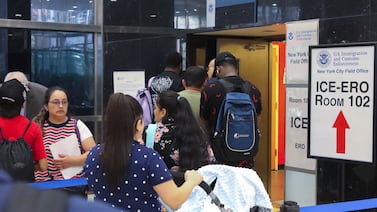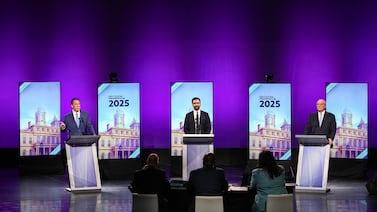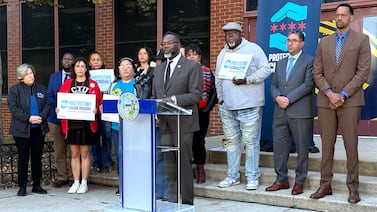Sign up for Chalkbeat Chicago’s free daily newsletter to keep up with the latest news on Chicago Public Schools.
Chicago Mayor Brandon Johnson threatened to sue the Trump administration if it follows through on a threat to withhold billions in federal education funding to states and districts over diversity, equity, and inclusion efforts.
In a letter Thursday, Craig Trainor, acting assistant secretary for civil rights with the U.S. Department of Education, told state education leaders they must certify within 10 days that their schools do not engage in any practices that the administration believes illegally promote diversity, equity, and inclusion.
“We’re gonna sue. It’s unconstitutional to disrupt freedom of speech,” Johnson said. “We’re not going to be intimidated by these threats, it’s just that simple. Whatever it is that this tyrant is trying to do to this city, we’re going to fight back.”
The latest threat comes after Trump’s education department already targeted Illinois and Chicago schools for equity efforts. In February, the department opened an investigation after a Virginia-based group filed a complaint challenging Chicago Public Schools’ recently-released Black Student Success Plan. In March, two conservative groups filed a Title IX complaint against Illinois, CPS, and a suburban district over its LGBTQ+ policies and the education department promptly began an investigation.
CPS received $1.3 billion in federal funding this academic year, $400 million of which flows to schools with high percentages of low-income students. The $1.3 billion in funding is about 13% of the district’s annual budget. The Trump administration specifically threatened to withhold these dollars, commonly known as Title I, in addition to other money earmarked by Congress to support specific populations in public schools.
Illinois education officials also said late Thursday they will “never waver” in helping all students “from every community, background, socioeconomic status, gender, and race – which is consistent with federal and state laws and our values.”
Illinois received $6.4 billion from the federal government this academic year for public education, $1.2 billion of which went to schools serving large percentages of students from low-income families.
Federal money for public schools, which are governed by local school boards and primarily funded by local property taxes and states, was already projected to decrease this year with the expiration of COVID relief dollars.
Illinois schools got roughly $7 billion in federal COVID relief funding over the past four school years. Chicago received about $2.8 billion of that money, which helped pay for existing and new staff, academic recovery programs, limiting class sizes, and growing its universal preschool program. A 2024 Chalkbeat spending analysis found an average 7% of Chicago’s school budgets came from COVID dollars.
The federal pandemic relief money helped Chicago schools cover a structural deficit that is once again plaguing the district’s budget. CPS typically begins its budgeting process for the coming school year in the spring, and distributes proposed budgets to principals and local school councils in April or May.
CPS did not respond to a request for comment on how a potential loss of federal funding could impact its budget, which was $9.9 billion this school year. Officials have previously estimated a deficit of about $500 million for the next academic year.
The school district must also grapple with the costs of a new contract with the Chicago Teachers Union. The two reached a tentative agreement Monday, but CTU members still must ratify the deal and the school board will need to approve it alongside a budget amendment.
Despite the looming financial pressures, Johnson said he would not “stand idly by” and that the Trump administration would “meet the muscle of working people, and it starts right here in Chicago.”
Johnson, a former union organizer and former social studies teacher, also pointed to the tentative agreement with the teachers union for provisions protecting teachers’ ability to teach Black history and protections for LGBTQ+ students and staff.
There is significant uncertainty around what practices the education department considers illegal. Guidance issued earlier this year says that schools wouldn’t be penalized just for teaching Black history but programming that “acts to shame” students based on their race or “accuse them of being oppressors” could create a hostile environment.
Congress allocates federal money to local public schools and the education department distributes it. The department can incentivize and penalize districts, but withholding federal funds is easier said than done. Public schools are largely locally controlled and decisions around curriculum, infrastructure, and programming are the jurisdiction of local school boards.
“You cannot withhold funding based on curriculum and I think we have to hold the line on that,” said Elizabeth Todd-Breland, a history professor at University of Illinois at Chicago and former member of the Chicago Board of Education. “I understand that that will include a legal fight, and that is a fight worth fighting.”
Becky Vevea is the bureau chief for Chalkbeat Chicago. Contact Becky at bvevea@chalkbeat.org .






